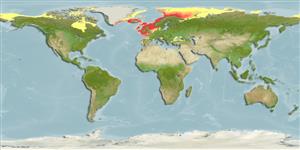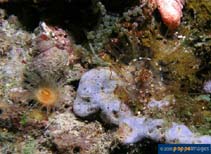Cerianthus lloydii Gosse, 1859
| Native range | All suitable habitat | Point map | Year 2050 |

|
| This map was computer-generated and has not yet been reviewed. |
| Cerianthus lloydii AquaMaps Data sources: GBIF OBIS |
Classification / Names Common names | Synonyms | CoL | ITIS | WoRMS
Hexacorallia | Ceriantharia | Cerianthidae
Environment: milieu / climate zone / depth range / distribution range Ecology
Sessile; depth range 15 - 535 m (Ref. 119523). Temperate; 82°N - 41°N, 37°W - 158°E
Distribution Countries | FAO areas | Ecosystems | Occurrences | Introductions
Arctic, Northeast Atlantic and the Mediterranean: Ireland and Germany. Temperate to polar.
Length at first maturity / Size / Weight / Age
Maturity: Lm ? range ? - ? cm
Life cycle and mating behavior Maturity | Reproduction | Spawning | Eggs | Fecundity | Larvae
Main reference
References | Coordinator | Collaborators
Harms, J. 1993 Check list of species (algae, invertebrates and vertebrates) found in the vicinity of the island of Helgoland (North Sea, German Bight) - a review of recent records. Helgoländer Meeresunters 47:1-34. (Ref. 2711)
IUCN Red List Status
(Ref. 130435: Version 2025-1)
CITES status (Ref. 108899)
CMS (Ref. 116361)
Threat to humans
Human uses
| FishSource |
Tools
More information
Max. ages / sizes
Length-weight rel.
Length-length rel.
Length-frequencies
Mass conversion
Abundance
Internet sources
BHL | BOLD Systems | CISTI | DiscoverLife | FAO(Publication : search) | Fishipedia | GenBank (genome, nucleotide) | GloBI | Gomexsi | Google Books | Google Scholar | Google | PubMed | Tree of Life | Wikipedia (Go, Search) | Zoological Record



